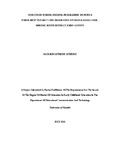| dc.description.abstract | School Feeding Program (SFP) as a social safety net has been popular in developing
countries as an instrument for achieving the Millennium Development Goals. These
programs are also advocated as important interventions for improving the human
capital of school-aged children. The SFP is essential to provide a balanced diet to
ECD children which would in turn enable the children to increase their attention span
hence better academic achievement. The SFP is a crucial component in the
development of a holistic child. The effect of under nutrition on young children aged
0-8 years can be devastating and enduring. Good nutrition is the first line of defence
against numerous childhood diseases, which can leave their mark on a child for life.
The purpose of this study was to establish effects of School Feeding Programme on
enrolment in early childhood education in Karaba Zone, Mbeere South District. This
study used descriptive research design. The target population was all the 29 head
teachers of public pre-schools and all the 94 ECD teachers in all the 29 public preschools
in Karaba Zone, Mbeere South District. Nine schools constituting 30% of the
29 schools in Karaba Zone, Mbeere South District were sampled. From each selected
public pre-school a census approach was used for all the head 9 teachers and 31 ECD
teachers. The study used both primary data and secondary data. The primary data was
collected using questionnaires and interviews guides. The study used both open and
close ended questionnaires which were administered to the head teachers and ECD
teachers. The researcher employed the use of interview to parents in data collection to
establish the background and attitude towards SFP and enrolment on early childhood
education. In this study a pilot study was conducted to ensure reliability with selected
respondents from one of the primary schools which were not included in the study.
The researcher sought assistance from the supervisor, peers and other university
lecturers, who were experts in research to ensure the validity of the instruments. The
quantitative data was analyzed using descriptive statistics where the responses from
the questionnaires were tallied, tabulated and analyzed using percentages, frequencies,
mean and standard deviation using Statistical Package for Social Sciences (SPSS).
The qualitative data from the interview guide and the open-ended questions in the
questionnaire were analyzed thematically using content analysis. The study found out
that the schools offer on-site meals where children are fed with food mainly lunch
while in school. 60.9% of the ECD teachers indicated that the types and methods of
targeting school feeding programmes affect the enrolment in early childhood
education in the schools to a great extent. Further, the study deduced that the
challenges faced in sustaining school feeding programmes in the schools include
some parents being unable to provide the required money, getting firewood is a
problem and paying the cook sometimes is a problem. On the same the study found
out that the challenges mentioned affect early childhood education enrolment to a
moderate extent. The study concluded that the school feeding programme has helped
in retaining the children in the school since its commencement, reduced abscentism,
improved performance as a result of daily attendance of school by children and the
health of the children has also improved as compared to when there was no feeding
programme. The study recommended that the school feeding programme should be
introduced in all schools in Kenya. | en_US |

